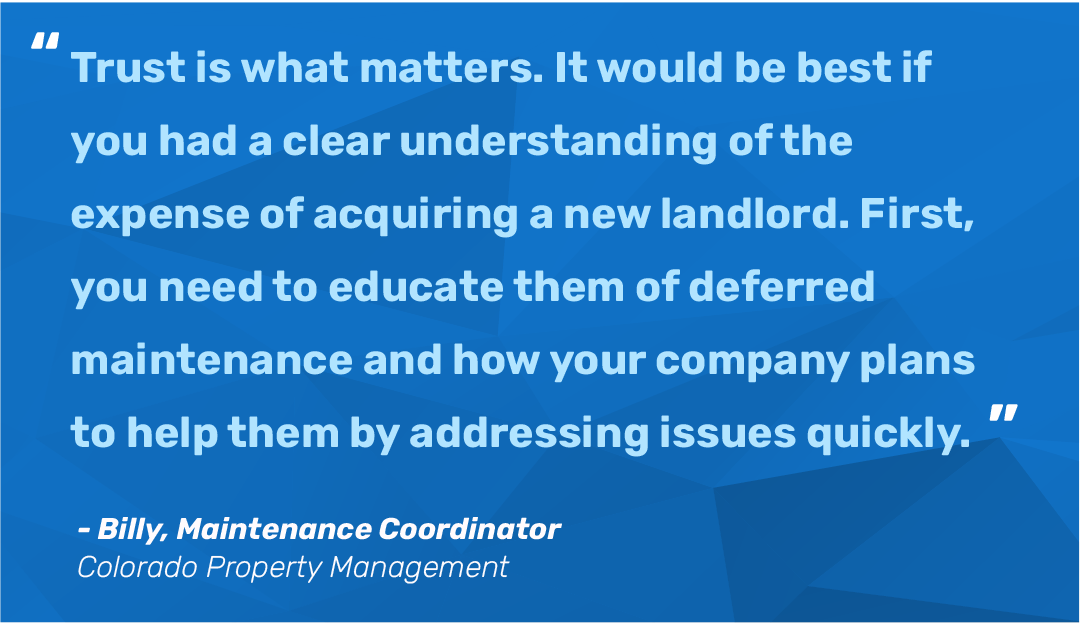Have you ever asked the question how does maintenance impact owner relationships? According to industry data, maintenance is the most significant source of stress for property owners, with 61% reporting it as a pain point. In fact, 60% of property owners say maintenance issues are the main reason they hire a property manager. Property maintenance has a massive impact on owner relationships and renewals. Hence, as a property manager, ensuring your maintenance process is operating at peak efficiency is key to keeping your owners happy. Keeping your owners happy makes your job easier and saves time and money from constantly acquiring new owners.
How Does Maintenance Impact Owner Relationships?
Maintenance can be one of the most costly parts of property management because it’s unpredictable, and most property owners try their best to steer clear of unpredictability. As a property manager, making maintenance a stable cost every month can improve your owner relationships and lead to less owner churn.
The best way to keep your owners satisfied with your maintenance process is to provide as much insight and transparency as possible. First, you can implement preventative maintenance practices to limit the number of costly maintenance emergencies that show up in your owner statements. With preventative maintenance, maintenance technicians can fix things before they break, keeping costs low and increasing the lifetime of your assets. Both of which is a win for your property owners.
If costly maintenance issues arise, the best thing to do is communicate with your owners upfront. It is better to discuss maintenance charges with your owners than for them to see them pop up on their monthly statements.
Christine Bennett, Co-Founder/CEO of Evolve Management Group, shared that as long as owners know what’s going on with their property, their property management company will still have control.
Bennett continued, “Bad news is delivered upfront. Anything above $200 is bad news to them. Owner Hub allows us to communicate with our owners and succeed in their expectations.”
Why is it Important to Increase the Lifetime of Your Owners
No matter what industry you are in, it is easier to upsell and keep a current customer than to acquire a new one. Maintaining positive relationships with your property owners is crucial to running a successful property management business. Not to mention, the longer an owner stays, the more profitable they will become.
A Customer Lifetime Value or CLTV measures the total revenue a business can expect from a single customer. The longer a customer stays, the more income you can generate.
Not only is finding new property owners costly, but it is also a time-consuming process for your team. If you constantly try to acquire new owners, you are losing out on opportunities to expand your company’s growth.
Billy Early, Maintenance Coordinator of Colorado Property Management, stressed the correlation between owner trust and lifetime value.

If you can build trust with your owners and ensure you have a smooth maintenance operation, your owners are more likely to stick around.
What are Property Owners looking for in a Property Manager?
First and foremost, property owners are looking for a property manager that can maintain their properties while generating a profit. But there is more to it than that. Property owners look for trust, transparency, communication, and credibility with their property managers.
As mentioned above, if you can keep your assets in good shape while keeping costs down, your owners will be happy with your maintenance process. When things like large-scale maintenance emergencies come up, the best thing to do is contact your owners upfront to get their approval on the cost. This way, they won’t have an unpleasant surprise when they receive their monthly owner statements. Giving your owners insight into the maintenance process will build trust and lead to a positive, long-lasting business relationship.
How to Keep Maintenance Costs Low
Keeping costs low is one of the main ways maintenance impacts owner relationships. There are a few key ways you can lower your maintenance costs without compromising the quality of your properties.
First, you can catch issues early by conducting regular inspections, preventing severe damage and costly repairs. During these inspections, you can also perform preventative maintenance to prolong the lifetime of your assets. Replacing HVAC filters, checking thermostats, and regularly cleaning ducts can save you money in the long run.
Another way to keep maintenance costs down is to ensure your maintenance process is as productive as possible. If your team is wasting time scheduling and following up with residents and vendors, you are wasting money on mundane tasks that you could be automating. Without an efficient process you may be wasting money on multiple trip charges, or accounting errors.
Key Metrics to Track and Provide to Property Owners
We have mentioned many ways to improve your owner relationships and maintain your owners for a longer time. Even if you implement everything we discussed, it only matters if you can prove to your owners that you are positively impacting their bottom line. That is where tracking and reporting KPIs come into place. KPIs or key performance indicators are metrics you can use to show your property owners the positive impact of your work.
Providing your owners with essential metrics shows them that you are moving the needle in the right direction. On the flip side, underperforming metrics will help you gain insight into areas of improvement. Metrics such as average speed or repair, resident satisfaction, and annual maintenance spend per unit are significant indicators of the successes or frustrations within your process.
Download our KPI Cheat Sheet to see crucial metrics and leading industry benchmarks.





